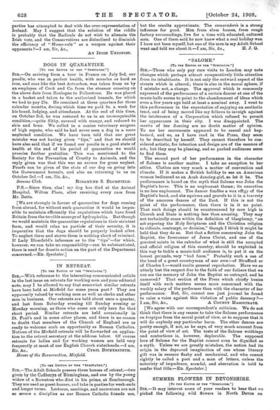" SALOME."
[TO THU ED/TOR OF THE ••SPROT1TOR."]
SIR,—Those who only pay rare visits to London may note changes which perhaps attract comparatively little attention from its inhabitants. It is not only the outward aspect of the streets which is altered; there is also in the moral sphere, if I mistake not, a change. The approval which is commonly expressed of the performance of a certain dancer at one of the music-halls seems to point to the abandonment of ideas which even a few years ago held at least a nominal sway. I went to this performance in the expectation of enjoying an aesthetic treat, and of being moved like my fellows to inveigh against the intolerance of a Corporation which refused to permit her appearance in their city. I was disappointed. The merits of her dancing are no doubt matter of opinion. To me her movements appeared to be casual and hap- hazard, and so, as I have read in the Preas, they seem to be described by herself. They cannot therefore be Con- sidered artistic, for intention and design are of the essence of art; but they may be pleasing, and so packed audiences seem to find them.
The second part of her performance in the • character of Salome is another matter. I take no exception to her attire. Clothes are very much a matter of convention- and climate. If it makes a British holiday to see an American woman bedizened as an Arab dancing-girl, so let it be. The performance is based on the myth that Salome was John the Baptist's lover. This is an unpleasant theme; its execution is no less unpleasant. The dancer fondles a wax effigy of the Baptist's head, and she squirms and grovels to it in a travesty of the amorous dances of the East. If this is not the point of the performance, then there is in it no point. That such doings should be countenanced by men high in Church and State is nothing less than amazing. They may not technically come within the definition of blasphemy, "an act exposing the Holy Scriptures and the Christian religion to ridicule, contempt, or derision," though I think it might be held that they do so. But that a fiction concerning John the Baptist, the forerunner of Jesus Christ, and one of the greatest saints in the calendar of what is still the accepted and official religion of this country, should be exploited in this way to tickle a music-hall audience is; to -put it on the lowest grounds, very "bad form." Probably such a use of the bead of a great countryman of our own—of Strafford or of Charles 1.—would excite general reprobation. Have we no utterly lost the respect due to the faith of our fathers that we can see the memory of John the Baptist so outraged, and be unmoved ? That section of the Press which chiefly busies itself with such matters seems more concerned with - the weekly salary of the performer than with the character of her performance: But, Sir, cannot one just journal be found to raise a voice against this violation of public decency ?-- [We agree with our correspondent's criticism. We do not think that there is any reason to take the Salome performance en tragique from the moral point of view, or to suppose that it will do anybody any particular harm. The other dances are pretty enough, if not, as he says, of very much account from the point of view of art. The taste of the Salome writhings and contortions is, however, deplorable. The supposed love of Salome for the Baptist cannot even be dignified as a myth. Unless we are greatly mistaken, the notion had its origin in the depraved imagination of one whose literary gift was in essence flashy and mechanical, and who cannot rightly be called a poet and a man of letters, unless the notoriety of impudence, scandal, and aberration is held to confer that title.—ED. Spectator.]














































 Previous page
Previous page